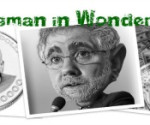Icelandic Airhead Economics – Krugman in Wonderland
Update: Krugman’s latest column continues the same narrative: (1) financial deregulation causes all of our problems, (2) inflation is the answer, and (3) despite massive inflation, which has slashed real wages, Iceland has not seen its standard of living fall.
I also find it interesting that he praises Iceland for letting the banks fail when, at the same time, he also has claimed that Washington needed to bail out Wall Street. Indeed, as is pointed out below, maybe it would have been prudent to let ours fail, too.
Although Krugman writes of the “path not taken,” the path he calls for is government control of the economy, easy money (inflation), central bank financing of government spending via the printing press, and capital controls. I would suggest that this is EXACTLY what is occurring today. If anything, the central banks and governments have blown up even bigger financial bubbles.
However, I would like to suggest another path: a real profit and loss system, not crony capitalism, and certainly not central bank financial tricks. End Update
As I write this, Paul Krugman is in Iceland and anyone who wants to watch him in a webcast can do so. Last month, when flying home from Latvia, we passed by Iceland and I can say that from the air, it is a barren place.
Its economy also has been barren, suffering a huge fall in about everything after its own speculative bubbles had fallen apart. Not surprisingly, Krugman claims that this was due to free markets, deregulation, and probably Milton Friedman, and the cure has been inflation and capital controls. Thus, Iceland is his poster child for doing things “correctly.”
There is another perspective, and Tim Cavanaugh at ReasonMagazine offers a very good and believable scenario, one that chronicles the same events as Krugman acknowledges, but adds something that Krugman has conveniently left out: how Iceland’s central bank engaged in the worst kind of moral hazard.
Cavanaugh notes:
For every government-driven bad improvement you can find in the west, you’ll find boom-era Iceland taking it to the next level.Where the U.S. Federal Reserve’s promise to backstop financial institutions was merely implicit, the Central Bank of Iceland in 2001 gave an explicit guarantee to big banks, making it inevitable that they would become bloated with risky and ultimately toxic assets. Our own government-sponsored—and as of 2008, government-owned—entities Fannie Mae and Freddie Mac made a hash of responsible lending by buying mortgages in the secondary market (and as we now know, lying about the poor quality of debt on their books). But Iceland’s government-run Housing Financing Fund managed to do even worse, lending directly to borrowers and competing with private lenders on both interest rates and loan quality. By mid-decade 90 percent of Icelandic households had government loans, and no-money-down home purchases were as common in Iceland as they were in Florida. (Emphasis mine)
You see, Krugman always assumes that free markets, be they in finance or anything else, have nothing to keep them from running over the cliff, and only the stern hand of government regulation can save the markets from themselves. Yet, we know that a profit-and-LOSS system provides its own brakes, provided that governments don’t try to override market verdicts, as they have done in the USA, Iceland, and Europe. As he always does, Krugman only tells part of the story.
As Cavanaugh notes, there is much more to the story than Krugman wants to admit. Iceland was not able to get much of anything resembling a bailout, and had to face the crisis alone:
This international neglect turned out to be Iceland’s saving grace. The crisis ended almost as quickly as it had begun. The Organization for Economic Co-operation and Development expects Iceland’s economy to grow by 2 percent this year and next. That’s not enough to replace the post-2007 loss, but it’s more than enough to return to the pre-boom trend line, and it’s much stronger than the performance of Portugal, Italy, Ireland, Greece, and Spain, affectionately know as the PIIGS economies. Iceland’s long-term interest rate, a not-inconsiderable 8 percent, compares well with a rate of over 13 percent for Greece, which is astounding when you consider that Iceland endured a default that Greece, in name at least, has so far avoided. The difference in unemployment—5.8 percent for Iceland against 16 percent for Greece—is even more striking. Iceland expects to have a balanced budget in 2013.
And then this, contradicting Krugman:
Paul Krugman naturally draws the wrong conclusion, contending that Iceland saved itself through rapid inflation and capital controls. This is like saying the March tsunami gave the people of Tohoku a nice chance to go swimming: Iceland’s central bank tried desperately to control the króna’s collapse before giving up. Nevertheless, Erlingsdottir is right: The “grownups”—a center-left coalition led by Social Democrat Johanna Sigurdardottir—are back in charge and have done their best to double down on the bad policies of the past, including reducing fish quotas when local fishermen most need to be producing and selling. The government is also, in the face of strong popular opposition, moving toward E.U. membership, which has worked out so beautifully for other troubled European economies.
So what’s causing the recovery? The plain-sight answer is the one nobody will consider. Iceland is coming back specifically because its banks went out of business. That happened in spite of strenuous public efforts, but the removal of the tiny nation’s colossally bloated financial sector turns out not to have eliminated all that much value.
There are some things to keep in mind. First, Iceland is substantially poorer than it was before. More people have work, but their real wages have fallen substantially from where they were before the crisis began. Currency crises have a way of exposing the problems, something Krugman does not want to admit, and the combination of default, inflation, and letting its banks implode means that Icelanders have received a huge dose of reality, and reality can suck at times.
Second, for all of the talk about rates of unemployment and having its exports being cheaper because of the decline in the country’s currency relative to other currencies, inflation hardly is the miracle “cure” that Krugman claims it to be. Yes, inflation has cut the real wages Icelanders earn by substantial amounts, which means they have received a real cut in pay, which in turn makes their labor substantially cheaper. However, they still have to produce something, and that means directing resources to the sustainable lines of production in Iceland’s economy.
Yes, I know that Krugman is a “macro” guy, and they look only at GDP figures. Thus, according to the Keynesians, World War II was a time of unprecedented prosperity because (1) everyone had work, and (2) GDP was high. What else do we need to know about the economy?
While Krugman has been touting bailouts and even having the Fed directly purchase government bonds to finance the government’s operations (as though this were a magic elixir instead of the fraud it really would be), he forgets that Iceland’s crisis was SO big that its central bank could not bail out anyone, despite an explicit promise from the central bank that it would backstop all losses. Furthermore, it never occurs to him that if we get rid of the moral hazard, we also get rid of the systematic wild speculation.
Instead, he continues to call for easy money, but he also wants that money to be tightly regulated, which in the end means that banks lend only to those firms that have a track record. One of the reasons there was so much pressure for deregulation in the 1970s and early 80s was that a large number of firms based upon the new high technologies and the new reality of telecommunications could not get capital from the usual lending sources.
For example, Ted Turner in setting up CNN, went to Michael Milken because the banks would not touch his cable news idea. Likewise, we never would have seen funding of a number of other familiar companies had the old regulatory structure remained. Unfortunately, what Krugman demands is both the old structure AND policies of easy money, which simply is not possible. Furthermore, his call for the Fed to be buying bonds wily-nily does not exactly speak to getting rid of the moral hazard that put us in this position in the first place.
If there is a lesson in Iceland, it is not what Krugman might be telling us. First, Iceland experienced the unthinkable: the utter collapse of its banks, but it lived to come back another day. On our front, for all of the dire talk of what might have occurred has the government not bailed out Wall Street, I believe that while the economy would have taken a hit, we already would be climbing well out of that hole and would in a full-fledged recovery.
Instead, we are in a depression, and Krugman is claiming that inflation and bailouts are the key to changing our economic direction. In other words, we can have prosperity and a free lunch, too. Just inflate.
William L. Anderson is an author and an associate professor of economics at Frostburg State University in Maryland. He is also an adjunct scholar with the Mackinac Center for Public Policy as well as for the Ludwig von Mises Institute in Alabama.
Read more at “Krugman-in-Wonderland”














